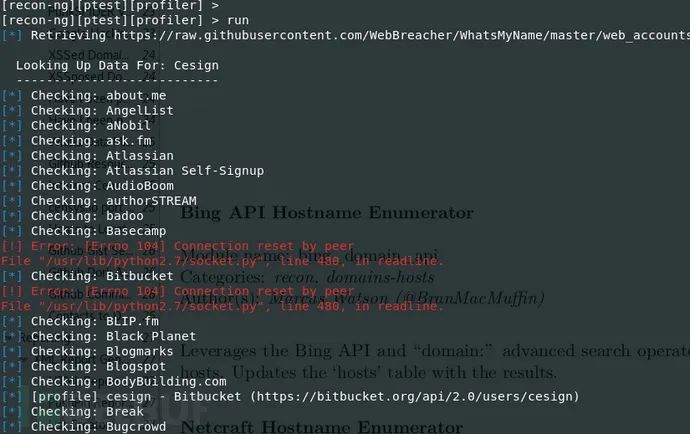
点击上方蓝字关注我们1免责声明 本公众号提供的工具、教程、学习路线、精品文章均为原创或互联网收集,旨在提高网络安全技术水平为目的,只做技术研究,谨遵守国家相关法律法 2022-7-20 11:40:19 Author: 网络安全自修室(查看原文) 阅读量:33 收藏
点击上方蓝字关注我们
前言:
最近在找Recon-ng详细一点的教程,可是Google才发现资料都很零散而且不详细,所以我打算具体写一下。
Recon-ng在渗透过程中主要扮演信息收集工作的角色,同时也可以当作渗透工具,不过相关的攻击模块很少,只有自己扩展。
其实Recon-ng最大的优点就是模块化,功能可以自己任意扩展。只要想象力够丰富,这个就可以成为神器,下面为详细教程。
0×01 安装
1. 安装recon-ng及依赖文件:
git clone https://bitbucket.org/LaNMaSteR53/recon-ng.git #然后把其中的文件移动到你希望的目录即可,并加入path即可
到其目录下运行recon-ng文件即可
./recon-ng
第一次启动时你可能会被告知有什么依赖没有安装,根据提示把依赖安装即可
pip install xlsxwriter #ie
#然后根据提示安装完即可
0×02 模块使用
1. 启动部分
recon-ng -h
可以看到上面的具体参数,常用的就‘-w’参数,我们这里新开一个工作区ptest
Recon-ng -w ptest
输入help可查看帮助,下面用法已解释得很清楚.
2. 模块
Recon-ng有侦查,发现,汇报,和攻击四大块(import没发现有多大的用处,所以暂时为四大块),可用show modules查看有哪些模块。下面我具体介绍下各板块下比较好用的模块和具体用法。
(1) 侦查版块
Profiler模块: 查询某个用户名在那些网站(知名)有注册。
可用 search profiler 查询在具体路径
使用模块:use recon/profiles-profiles/profiler
查看用法:show info
根据提示,需要设置SOURCE选项,用命令:set SOURCE cesign
然后运行:run
查看结果(根据提示更新了profiles表,查看表的命令为show
这是我的用户名,上面的网站好像我只有注册过两个。这个脚本是可以扩展的,所以你可以扩展你想要查找的网站,关于模块的创建后面解释。
Hashes_org模块:反查哈希加密
#这个模块需要api key才能用,下面提一下api key的添加和删除
Keys list #查看现有的api keys
Keys add hashes_api akshdkahsdhkhasdkjfhkshfdkasdf
Keys list #可看到api已被添加进去
Keys delete hashes_api #删除key
#对于delete还可以删除表,如删除profiles的1-2行 Delete profiles 1-2#Api被添加进去后就可以用了(api的申请我就不介绍了) Set source e13dd027be0f2152ce387ac0ea83d863 Run #可以看到被解,加密i方式为md5
Metacrawler模块:网站文件搜索(如pdf,xlsx文件等,其实就是google hack技术)
Search metacrawler
Use recon/domains-contacts/metacrawler
Set source hdu.edu.cn
run
Dev_diver模块:查找某个用户是否存在某些代码库
Search dev_diver
Use path-to/dev_diver
Show info
Set source cesign Run #结果如图所示
Ipinfodb模块:查询ip的相关信息,如地理位置(这个功能要api)
Search ipinfodb
Use path-to/ipinfodb
Show info
Set source 104.238.148.9 run
Brute_hosts模块:暴力破解子域名
Search brute_hosts
Use path-to/brute_hosts
Show info
Set source hdu.edu.cn Run Show hosts
Google_site_web模块:相关域名查询(子域名)
Search google_site_web
Use path-to/google_site_web
Show info
Set source **** Run Show options:列出可用的选
(2)发现版块
Interesting_files模块:查找某网站的敏感文件
命令跟前面一样
Search interesting_files
Use discovery/info_disclosure/interesting_files
Show info #查看用法,可以看到参数比较多,含义我就不解释了我这里尝试一下自己的网站(可以自己添加敏感文件)
Set source jwcesign.studio
Set port 80
Set protocol http Run
结果如下(没有敏感文件)
(3)攻击版块
command_injector模块:命令注入,多用于木马文件
Search command_injector
Use path-to/command_injector
Show info #可以看到具体的参数
set base_url http://172.16.227.128/other/a.php
木马文件a.php代码如下:
Set parameters cmd=<rce>
run
(4)报告版块
Html模块:把运行的结果生成html文件
Search html
Use path-to/html
Show info
Set creator cesign Set customer cesign run
0×03 模块的构建
前面都是软件自带的模块,如果我们想自己建立模块,该怎么办呢?
下面是教程
如果要建立自己的模块,在home目录下的’.recon-ng’下建立modules文件夹,然后在分别根据模块属性来建立文件,如建立侦查板块,需要建立recon文件夹,下面以我建立一个模块为例:
Cd ~
Cd .rcon-ng
Mkdir modules
Cd modules
Mkdir recon
Cd recon
Mkdir findproxy
Cd findproxy
Vim find_proxy.py
模块文件主要的格式就是
from recon.core.module import BaseModuleclass Module(BaseModule): meta = { 'name': 'something...', 'author': ‘something...’, 'description': 'something...', 'query': something...' ##这个最好写清楚,方便别人查看用法 } def mudule_run(self[,type]): #some code,self参数可以用来获取一些api key等, type含有source的数据 Pass
下面是我具体的代码,这是一个找代理的模块(http proxy,https proxy,socks4 proxy,sockts5 proxy )
#-*- coding: utf-8 -*-
from recon.core.module import BaseModule
import re
from selenium import webdriver
from selenium.webdriver.common.desired_capabilities import DesiredCapabilities
from bs4 import BeautifulSoup
import subprocess import os
import urllib import copy
import time import jsbeautifier
class Module(BaseModule): meta = { 'name': 'Find free proxy...', 'author': 'Cesign', 'description': 'find defferent proxy, there are four kinds of proxy,http,https,socks4 and socks5, and the code is h,s,4,5....Enjoy!!!', 'query': 'find defferent proxy, there are four kinds of proxy,http,https,socks4 and socks5, and the code is h,s,4,5....Enjoy!!!' } def module_run(self,type): STYLE = { 'fore': { # 前景色 'black' : 30, # 黑色 'red' : 31, # 红色 'green' : 32, # 绿色 'yellow' : 33, # 黄色 'blue' : 34, # 蓝色 'purple' : 35, # 紫红色 'cyan' : 36, # 青蓝色 'white' : 37, # 白色 }, 'back' : { # 背景 'black' : 40, # 黑色 'red' : 41, # 红色 'green' : 42, # 绿色 'yellow' : 43, # 黄色 'blue' : 44, # 蓝色 'purple' : 45, # 紫红色 'cyan' : 46, # 青蓝色 'white' : 47, # 白色 }, 'mode' : { # 显示模式 'mormal' : 0, # 终端默认设置 'bold' : 1, # 高亮显示 'underline' : 4, # 使用下划线 'blink' : 5, # 闪烁 'invert' : 7, # 反白显示 'hide' : 8, # 不可见 }, 'default' : { 'end' : 0, }, } def UseStyle(string, mode = '', fore = '', back = ''): mode = '%s' % STYLE['mode'][mode] if STYLE['mode'].has_key(mode) else '' fore = '%s' % STYLE['fore'][fore] if STYLE['fore'].has_key(fore) else '' back = '%s' % STYLE['back'][back] if STYLE['back'].has_key(back) else '' style = ';'.join([s for s in [mode, fore, back] if s]) style = '\033[%sm' % style if style else '' end = '\033[%sm' % STYLE['default']['end'] if style else '' return '%s%s%s' % (style, string, end) print '[*] Please wait, it will take about 2 minutes...' dcap = dict(DesiredCapabilities.PHANTOMJS) dcap["phantomjs.page.settings.userAgent"] = ( "Mozilla/5.0 (X11; Linux x86_64; rv:45.0) Gecko/20100101 Firefox/45.0" ) driver = webdriver.PhantomJS(desired_capabilities=dcap,service_log_path=r"/home/cesign/watchlog.log") driver.set_window_size(1920, 1080) driver.get('https://hidemy.name/en/proxy-list/?type='+str(type[0])+'#list') time.sleep(1) soup=BeautifulSoup(driver.page_source,'html.parser') allurl=soup.find_all(name='td') result={ 'h':lambda x:'http', 's':lambda x:'https', '4':lambda x:'socks4', '5':lambda x:'socks5', } i = 0 print UseStyle('[*] Search proxy: type:'+result[str(type[0])]('hello'),fore='blue') print UseStyle('[*] IP adress---Port---Country,City---Speed---Type---Anonymity---Last check',fore='blue') while True: try: part = [] part = allurl[i:i+7] i = i+7 print UseStyle('[*]'+part[0].text+'---'+part[1].text+'---'+part[2].text+'---'+part[3].text+'---'+part[4].text+'---'+part[5].text+'---'+part[6].text,fore='green') except: break driver.quit()
然后调用模块:
ReloadSearch find_proxy
Use path-to/find_proxy
Show info
Set source h Run
可以看到如此多的http代理,匿名做事就不成问题了
如果想要系统学习网络安全技术
不妨加入知识星球课程
《60天入门网络安全渗透测试》
从入门到案例,贴合实战
轻松易懂、好玩实用
限时领取
知识星球
优惠券
跟着60天入门学习路线一起学
期待你的到来!
往期推荐
从入门到入狱的技术,可以学,别乱用!
网络安全学习方向和资源整理(建议收藏)
一个web安全工程师的基础学习规划
资源 | 渗透测试工程师入门教程(限时领取)
5年老鸟推荐10个玩Python必备的网站
推荐十个成为网络安全渗透测试大佬的学习必备网站!
那些社工师不为人知的秘密。。。
更多内容请关注公众号
网络安全自修室
点个在看你最好看
如有侵权请联系:admin#unsafe.sh